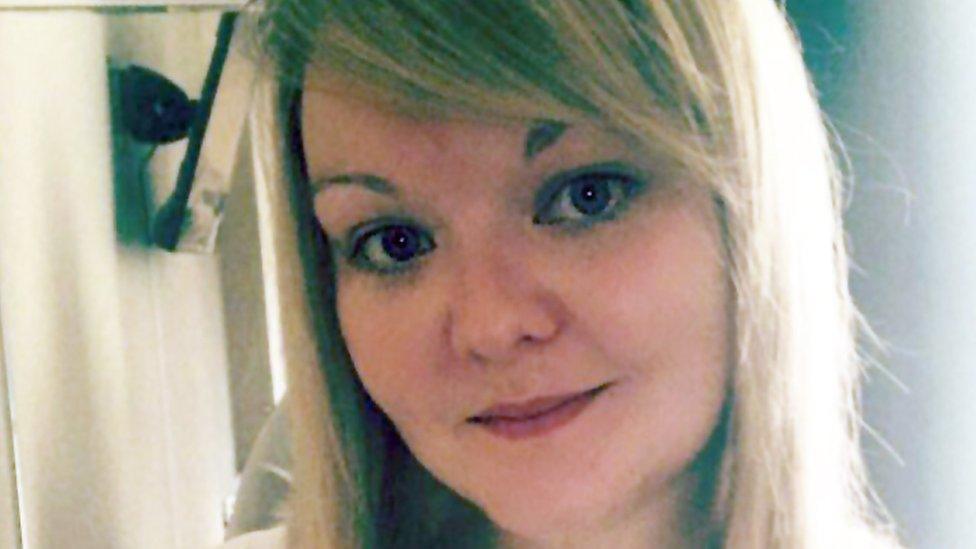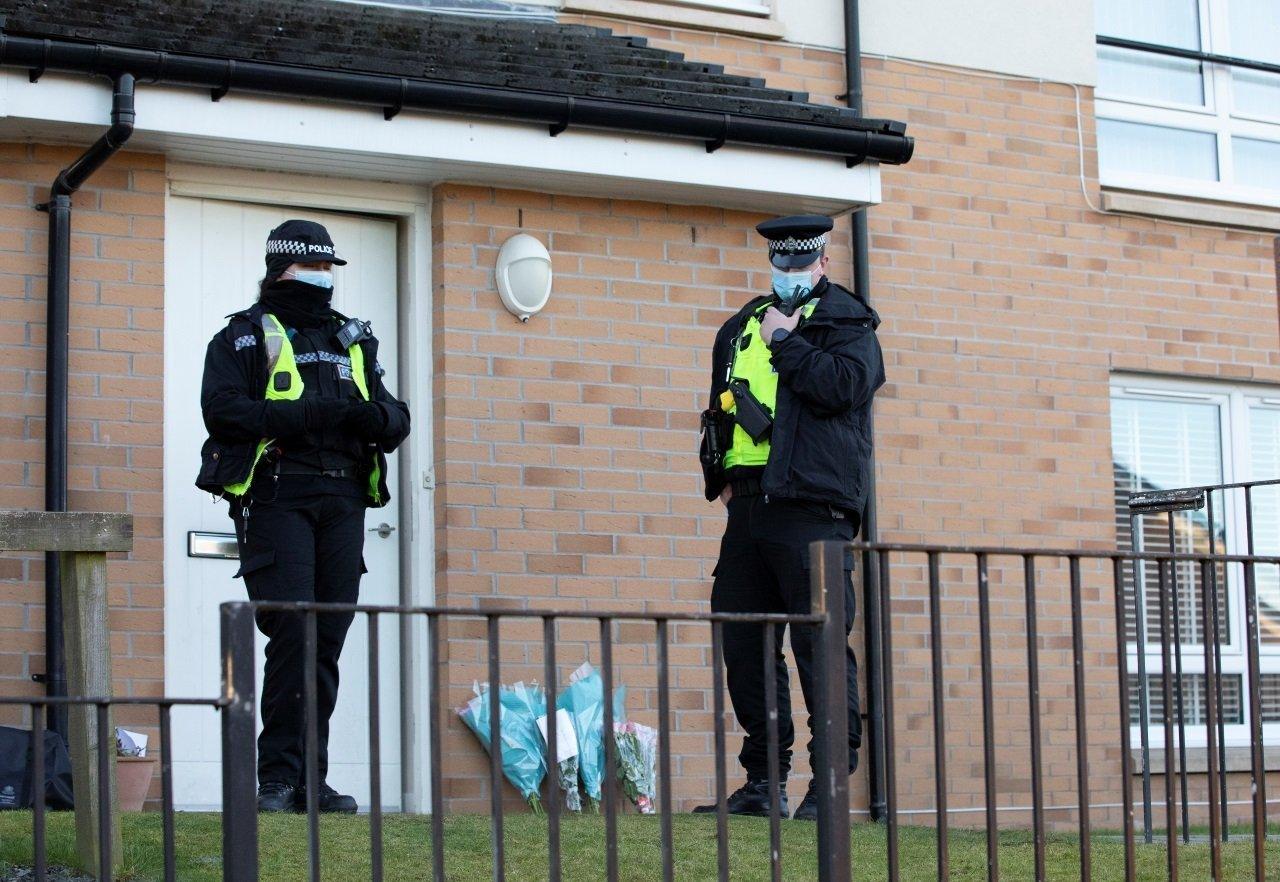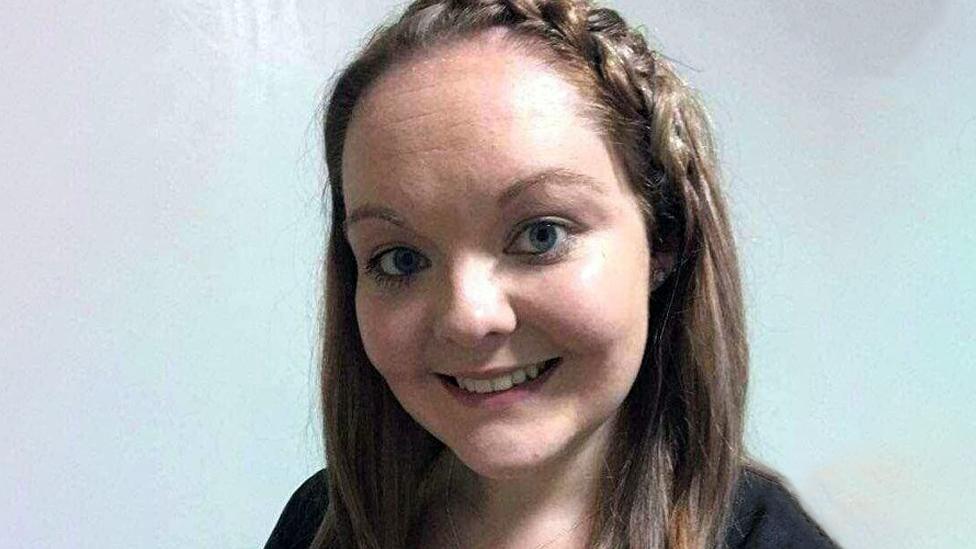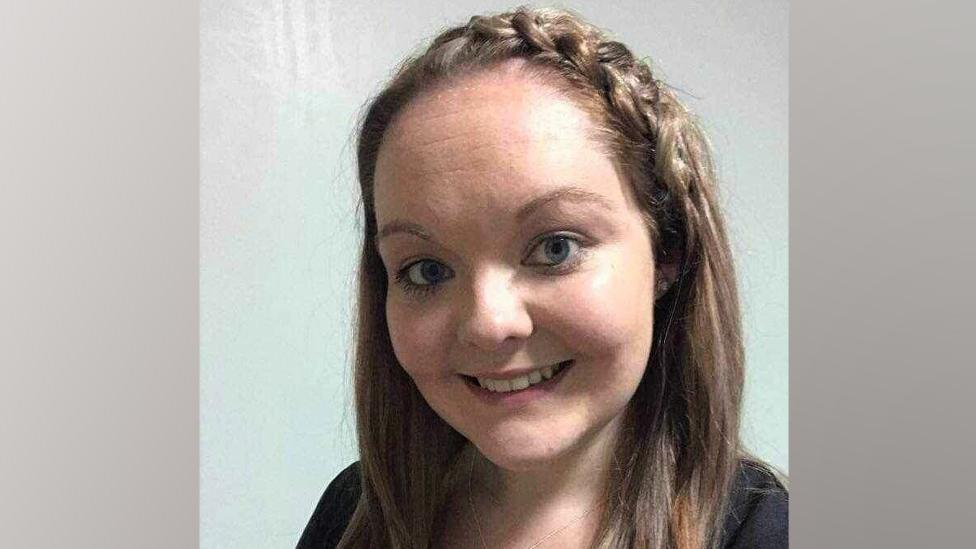Man who murdered new girlfriend jailed for 23 years
- Published

Claire Inglis suffered 76 injuries in the fatal attack
A man who murdered his new girlfriend weeks after being bailed to her Stirling home has been jailed for a minimum of 23 years.
Christopher McGowan and Claire Inglis had been together eight weeks when he was released to stay at the flat she shared with her young son.
Judge Michael O'Grady said McGowan's actions were "beyond sadistic" as he issued a life sentence.
He said Ms Inglis had suffered "nothing short of torture" at McGowan's hands.
"It was difficult to portray the brutality of what you inflicted on her. You have shown not a flicker of emotion, distress or remorse," the judge added.
Ms Inglis' family, who attended every day of the trial, wept at the High Court in Edinburgh as McGowan's sentence was read out.
The judge said her family and friends now faced "the anguish of living without her".
He added: "I shudder to imagine what her last minutes were like. To describe what you did as sadistic falls woefully short of the mark.
"It was beyond sadistic."

Ian and Fiona Inglis, Claire's parents, said they were elated their daughter's killer was off the streets.
Ian and Fiona Inglis, Claire's parents, said they were elated their daughter's killer was off the streets.
They said they were pleased that the judge had "saw through [McGowan's] lies".
Fiona Inglis told BBC Scotland: "The truth came out. He brutally murdered our daughter in cold blood. He tortured her and killed her. We've got to live with that for the rest of our life."
The Inglis family also called for an investigation into the case, and say they want someone to take accountability for the decision to allow McGowan to live at their daughter's home. They do not think he should have been allowed to live there with the convictions he had.

Christopher McGowan had 40 previous convictions, including three for assault
McGowan murdered Ms Inglis after he was released on bail to stay at her housing association flat.
The 28-year-old had 40 previous convictions, mostly for breaches of the peace and breaches of bail, as well as three convictions for assault.
One of the breaches of the peace from 2014 had a domestic aggravation, but this did not involve Ms Inglis.
He had also served an 18-month jail term for assault and robbery.
In the months before Ms Inglis' death, he was granted bail five times.
After pleading guilty to a driving offence, he was released on bail to Ms Inglis' home. The Crown did not oppose bail.
Normally, bail would only be opposed in these circumstances if there was specific intelligence that someone was at risk.
A spokeswoman for the Scottish government said decisions on whether to grant bail were for courts to make independently.
Judge Michael O'Grady describes Christopher McGowan's actions as "beyond sadistic"
The court heard how bail was granted after McGowan said he was desperate to be released following his mother's death, claiming he did not want to attend her funeral in handcuffs.
He claimed the couple were in a "positive" relationship, and vowed to kick his Valium habit and stop drinking.
Once living at Ms Inglis' flat, he set about pawning her possessions - including a watch she received for her 21st birthday and her son's PlayStation.
It was there he battered and strangled the 28-year-old mother-of-one, before burning her with a lighter and pushing a wet wipe down her throat.
The jury took two hours to convict McGowan of murder.
He initially claimed to have been acting in self-defence, but that claim was subsequently withdrawn during the trial.
His account of the night of the murder ranged from claiming Ms Inglis had fallen down the stairs of her flat, to saying she had overdosed on Valium and he had tried to save her life.

Claire Inglis was murdered in her home on 28 November 2021
The trial heard how a taxi driver who picked up McGowan and Ms Inglis the previous evening in Stirling city centre heard McGowan say "I'll kill you" under his breath after Ms Inglis left the taxi.
She sustained 76 injuries during the attack. These included a number of blunt force impacts to the head and face, and extensive bruising to almost her entire skull.
Speaking during sentencing, the judge told McGowan: "It is clear that you have accepted no responsibility and you have gone to great lengths to minimise your involvement."
McGowan's apparent remorse, expressed to social workers after his conviction, was described by the judge as "a self-serving tissue of lies".

The judge's fury over Claire Inglis' murder was reflected in the unusually long sentence he gave her killer, with, Lord O'Grady stressed, no guarantee that Christopher McGowan will ever be released.
But given McGowan was on five bail orders when he took Claire's life, people will rightly ask whether this horrendous case highlights failings in the system.
It's not unknown for repeat offenders to be bailed before sentence and McGowan's long criminal record will be depressingly familiar to anyone who frequents our courts.
Judges take bail decisions based on what they know at the time and what's said by the defence and prosecution. They consider what the prisoner has been accused of, what they've done in the past and their current personal circumstances.
Given his record, McGowan must have been edging closer to being held on remand but instead he was given the benefit of the doubt and freed with conditions attached.
No-one would have supported bail if they thought he had presented a serious risk to Claire and such an extreme escalation in a criminal's behaviour is well-nigh impossible to predict, without any prior warning signs.
Should it have been handled differently? There's no obvious route for an official review of the decisions that were taken.
The wider context is that Scotland already has Western Europe's highest prison population and the prevailing political mood is for more use of bail and community sentences.
Coming into force soon is the new Bail and Release (Scotland) Act which says remand should only be used as a last resort for those who pose a risk of inflicting serious harm.
Campaigners from groups like Scottish Women's Aid fear it could result in dangerous men being granted bail but the Scottish government says the Act includes safeguards which stress the importance of victims' safety.

Watch now on BBC iPlayer: Killed by my boyfriend - The story of Claire Inglis, who was murdered by Christopher McGowan while he was out on bail

Related topics
- Published25 October 2023

- Published28 September 2023

- Published26 September 2023

- Published25 September 2023
